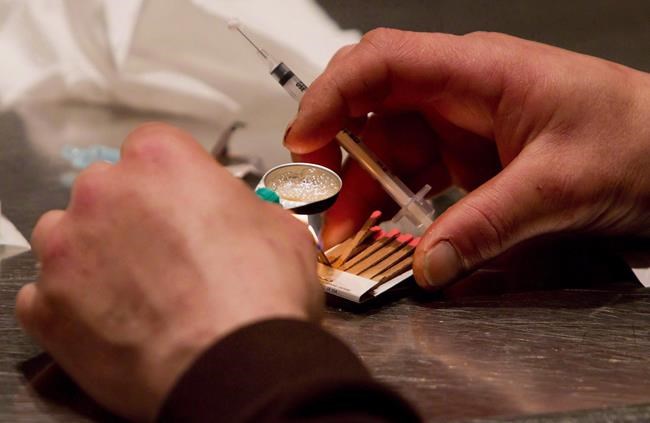Advocates await support for safe consumption sites
Advertisement
Read this article for free:
or
Already have an account? Log in here »
To continue reading, please subscribe:
Monthly Digital Subscription
$0 for the first 4 weeks*
- Enjoy unlimited reading on winnipegfreepress.com
- Read the E-Edition, our digital replica newspaper
- Access News Break, our award-winning app
- Play interactive puzzles
*No charge for 4 weeks then price increases to the regular rate of $19.00 plus GST every four weeks. Offer available to new and qualified returning subscribers only. Cancel any time.
Monthly Digital Subscription
$4.75/week*
- Enjoy unlimited reading on winnipegfreepress.com
- Read the E-Edition, our digital replica newspaper
- Access News Break, our award-winning app
- Play interactive puzzles
*Billed as $19 plus GST every four weeks. Cancel any time.
To continue reading, please subscribe:
Add Free Press access to your Brandon Sun subscription for only an additional
$1 for the first 4 weeks*
*Your next subscription payment will increase by $1.00 and you will be charged $16.99 plus GST for four weeks. After four weeks, your payment will increase to $23.99 plus GST every four weeks.
Read unlimited articles for free today:
or
Already have an account? Log in here »
Hey there, time traveller!
This article was published 09/05/2022 (1315 days ago), so information in it may no longer be current.
Safe consumption site advocates are waiting for the Progressive Conservative government to follow the lead of other provinces in keeping people alive — and save money doing it.
“Our current strategies are not working,” said Shohan Illsley, executive director of the Manitoba Harm Reduction Network. “In the last year, 407 people have died from the toxic drug supply.”
Late last month, Street Connections issued an alert about Main Street Project reporting three overdoses on its premises April 27. In each instance, staff located the community member and were able to reverse the suspected overdose by administering naloxone.

Street Connections, a Winnipeg Regional Health Authority agency, noted one other community agency, which it didn’t name, also reported a spike in suspected overdoses on the same date.
Main Street Project executive director Jamil Mahmood said Friday he’s “optimistic” the province will soon get on board with safe consumption sites.
On April 28, Mental Health and Community Wellness Minister Sarah Guillemard said her government is looking at what works in other jurisdictions and safe consumption sites can work “if they’re used in conjunction with strong core services.”
“The comments from the minister are really promising because they signify at least being open to make the argument for it, and that’s kind of what the community has been asking for,” Mahmood said.
Several provinces — including conservative-led Alberta — have supervised illicit substances consumption sites and, aside from saving lives, the centres save the health system money, he said.
A study published March 28 in the Harm Reduction Journal showed more than $2.3 million in cost savings occurred through the implementation of the Safeworks Harm Reduction Program in Calgary from November 2017 to January 2020. The savings resulted from clients avoiding the need for ambulance services and emergency department visits, with staff at supervised consumption site treating an overdose.
A study published in the International Journal of Drug Policy in 2009 found Vancouver’s supervised injection facility, Insite, prevented 35 new HIV cases and three deaths with a societal benefit of $6 million per year.
Main Street Project cited more than a dozen studies from other jurisdictions showing the benefits of safe consumption sites and savings for the health-care system.
“So even from a dollars-and-cents point of view or value for money, there’s value in investing in safe consumption sites,” said Mahmood. “It’s actually a sound health investment to do these and that’s where we’re moving towards, I hope.”
The need in Winnipeg has been studied, discussed and reported on 15 times but government has failed to act, added Illsley.
In January, a report consolidated all the findings with a call to action, including the creation of safe consumption sites, drug checking services, and managed alcohol programs.
Aside from Guillemard’s recent comments, the PC government hasn’t embraced the topic.
On April 29, at an unrelated news conference, Premier Heather Stefanson didn’t dismiss it outright but said her government’s focus remains on rapid access to addictions medicine walk-in clinics for adults to get help with high-risk substance use and addiction.
Mahmood said safe consumption sites help people stay alive so, if and when they’re ready, they can seek help at a RAAM clinic.
“(They) are about harm reduction and removing immediate harms and prevention of death, preservation of life,” he said. “They’re not for addiction recovery or a process of addiction recovery — they’re for people wherever they’re at in their journey.”
carol.sanders@freepress.mb.ca

Our newsroom depends on a growing audience of readers to power our journalism. If you are not a paid reader, please consider becoming a subscriber.
Our newsroom depends on its audience of readers to power our journalism. Thank you for your support.
History
Updated on Monday, May 9, 2022 6:16 AM CDT: Adds photo


